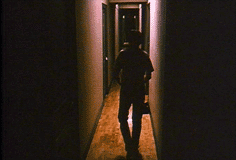|
Newest Reviews:
New Movies -
The Tunnel
V/H/S
The Tall Man
Mama Africa
Detention
Brake
Ted
Tomboy
Brownian Movement
Last Ride
[Rec]≥: Genesis
Hara-Kiri: Death of a Samurai
Indie Game: The Movie
Abraham Lincoln: Vampire Hunter
Old Movies -
Touki Bouki: The Journey of the Hyena
Drums Along the Mohawk
The Chase
The Heiress
Show
People
The Strange Affair of Uncle Harry
Pitfall
Driftwood
Miracle Mile
The Great Flamarion
Dark Habits
Archives -
Recap: 2000,
2001, 2002,
2003, 2004
, 2005, 2006,
2007 , 2008
, 2009 ,
2010 , 2011 ,
2012
All reviews alphabetically
All reviews by star rating
All reviews by release year
Masterpieces
Screening Log
Links
FAQ
E-mail me
HOME
| |
LíEnfer (Claude Chabrol, 1994)
 Charting the descent into madness with
almost obsessive persistence, Claude Chabrolís LíEnfer denies the
audience conventional relief from that decline by eliding with precision any
sequences that might alleviate tension. As such, itís a fiercely gripping
thriller, made more troubling by Chabrolís decision to stop the film at its
protagonistís low point and refuse the reconciliatory scene that one would
expect. It has the ruthlessness and psychological depth that one would expect of
a film that has had its script adapted from an unfilmed work by Gallic suspense
director Henri-Georges Clouzot. Set at a hotel in the French countryside, it
begins as a husband and wife (Francois Cluzet & Emmanuelle Beart) meet for
the first time, then watches the gradual dissolution of their relationship.
Though there are other characters, they exist mostly to prompt bouts of his mad
jealousy, essentially making the movie a two-character piece. As the title
suggests (itís French for Hell), the narrative trajectory is a downward
spiral, and in watching the two characters size each other up as their
expectations of one another are smashed, Chabrol finds a fair amount of
heartbreak. If the movieís jump into the husbandís subjective delusions
leaves realism behind, that decision allows Chabrol to work some cruel social
commentary into the story. Beartís character claims, in one moment that may or
may not be really happening, that she only stays with her husband because she
needs his money. Similarly, the guests at the hotel write off many of his wild
outbursts as the socially unacceptable, but expected, ravings of a drunkard.
Itís the expectation of some degree of dissatisfaction in her life that seems
to keep Beartís character in her miserable state, and that theme fits in
perfectly with Chabrolís overriding worldview. Charting the descent into madness with
almost obsessive persistence, Claude Chabrolís LíEnfer denies the
audience conventional relief from that decline by eliding with precision any
sequences that might alleviate tension. As such, itís a fiercely gripping
thriller, made more troubling by Chabrolís decision to stop the film at its
protagonistís low point and refuse the reconciliatory scene that one would
expect. It has the ruthlessness and psychological depth that one would expect of
a film that has had its script adapted from an unfilmed work by Gallic suspense
director Henri-Georges Clouzot. Set at a hotel in the French countryside, it
begins as a husband and wife (Francois Cluzet & Emmanuelle Beart) meet for
the first time, then watches the gradual dissolution of their relationship.
Though there are other characters, they exist mostly to prompt bouts of his mad
jealousy, essentially making the movie a two-character piece. As the title
suggests (itís French for Hell), the narrative trajectory is a downward
spiral, and in watching the two characters size each other up as their
expectations of one another are smashed, Chabrol finds a fair amount of
heartbreak. If the movieís jump into the husbandís subjective delusions
leaves realism behind, that decision allows Chabrol to work some cruel social
commentary into the story. Beartís character claims, in one moment that may or
may not be really happening, that she only stays with her husband because she
needs his money. Similarly, the guests at the hotel write off many of his wild
outbursts as the socially unacceptable, but expected, ravings of a drunkard.
Itís the expectation of some degree of dissatisfaction in her life that seems
to keep Beartís character in her miserable state, and that theme fits in
perfectly with Chabrolís overriding worldview.
 LíEnferís style becomes more dominant as the film progresses, but it
never feels as if it is getting in the way of the study of the characters. At
the beginning, thereís an episodic approach, with small moments of their lives
being shown as their relationship develops separated by jarring cuts to black.
As the film continues and the husbandís madness grows more dominant, the
segments get longer and the time lapsed between each one grows shorter, giving
the impression that his illness is degenerative and gaining momentum. When the
film finally settles down into a single time period, and heís gone completely
mad, Chabrol doesnít still fade to black, but shoots many scenes in very dim,
nearly black light to give the viewer the same effect that the darkness had. The
use of expressionistic lighting and the design of the hotel is unmissiable, but
itís integrated subtly enough that it doesnít make the film lose all of its
grounding in reality. Thereís very little thatís extraneous in the filmís
construction, and because of the ever-increasing momentum the tension escalates
smoothly. Surely key to the experience are the performances. Cluzet seems to be
alternately scared, charming, and insane. Beart has to be the vamp that her
husband sees her as but still maintain the aura of an innocent victim to create
audience empathy, and she manages to do this splendidly. Even if it is too much
a stripped down genre piece to reach dizzying heights, LíEnfer does an admirable job of exploring the depths of one
disturbed manís psyche.
LíEnferís style becomes more dominant as the film progresses, but it
never feels as if it is getting in the way of the study of the characters. At
the beginning, thereís an episodic approach, with small moments of their lives
being shown as their relationship develops separated by jarring cuts to black.
As the film continues and the husbandís madness grows more dominant, the
segments get longer and the time lapsed between each one grows shorter, giving
the impression that his illness is degenerative and gaining momentum. When the
film finally settles down into a single time period, and heís gone completely
mad, Chabrol doesnít still fade to black, but shoots many scenes in very dim,
nearly black light to give the viewer the same effect that the darkness had. The
use of expressionistic lighting and the design of the hotel is unmissiable, but
itís integrated subtly enough that it doesnít make the film lose all of its
grounding in reality. Thereís very little thatís extraneous in the filmís
construction, and because of the ever-increasing momentum the tension escalates
smoothly. Surely key to the experience are the performances. Cluzet seems to be
alternately scared, charming, and insane. Beart has to be the vamp that her
husband sees her as but still maintain the aura of an innocent victim to create
audience empathy, and she manages to do this splendidly. Even if it is too much
a stripped down genre piece to reach dizzying heights, LíEnfer does an admirable job of exploring the depths of one
disturbed manís psyche.
* * * 1/2
06-04-03
Jeremy Heilman
|